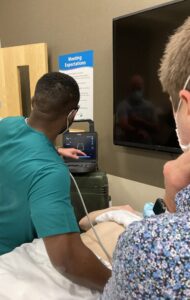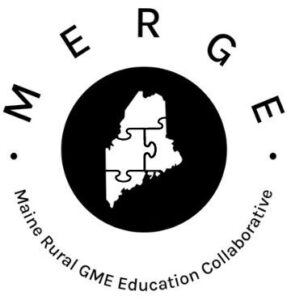Our clinical experiences are designed to provide residents with robust training in the full spectrum of family medicine as well as to offer opportunities for exploring other areas of medicine and following individual passions.
Required Experiences
With the exception of an inpatient  pediatric rotation at Maine Medical Center in Portland, required clinical rotations are based within our local hospital system.
pediatric rotation at Maine Medical Center in Portland, required clinical rotations are based within our local hospital system.
The bulk of our clinical experiences are structured as four-week blocks. Outpatient continuity practice is longitudinal, and residents assume more patient-seeing time in their family medicine clinics as they progress through training. Some outpatient experiences, such as geriatrics, pediatrics, and OB/GYN, are organized as four-week blocks with additional exposure longitudinally. Inpatient adult medicine is arranged in a block format with progressive supervising, teaching, and patient care responsibilities within the inpatient service in the second and third years of training. See sample schedule for details.
Electives
There is a wide variety of elective opportunities, some of which are well established and others of which have room to be tailored to a resident’s individual learning goals. Many of our community specialists have a particular interest in hosting and teaching residents; our local and international faculty and alumnae connections can lead to quite a diverse offering of elective topics and locations. Elective choices include:
- Acupuncture
- Addiction Medicine
- Community-Based Outpatient Family Medicine
- Dermatology
- EKG Reading
- Emergency Medicine
- Farmworker Health & Advocacy
- Geriatric Medicine
- Gynecology
- Healthcare Improvement
- Inpatient Medicine Subspecialties
- Integrative Medicine
- International Medicine (Honduras)
- Obstetrics
- Office-Based Procedures
- OMT/OMM
- Outpatient Medicine Subspecialties
- Primary Care Research
- Residents as Educators
- Sexual and Reproductive Health
- Sports Medicine
 MDFMR is a member of the Maine Rural Graduate Medical Education (MERGE) Collaborative, which is a partnership of the four Maine Sponsoring Institutions for graduate medical education, who share a commitment to expanding rural training opportunities for resident physicians training in Maine.
MDFMR is a member of the Maine Rural Graduate Medical Education (MERGE) Collaborative, which is a partnership of the four Maine Sponsoring Institutions for graduate medical education, who share a commitment to expanding rural training opportunities for resident physicians training in Maine.
MERGE coordinates rural rotations in a variety of specialties at various locations across the state. MDFMR residents are eligible to participate in elective rotations at rural training sites through the MERGE Collaborative.
Osteopathic Medicine
As a training program for both allopathic and osteopathic family physicians, MDFMR believes it is important for allopaths to have exposure to osteopathic principles and practice, and for osteopaths to develop skill in osteopathic manipulative techniques.
All of our residents participate in monthly osteopathic education, usually in combined sessions. Our osteopathic faculty, sometimes in conjunction with our ONMM residents, are present as table trainers to help allopathic residents gain competence in palpation and basic manual medicine techniques and help osteopathic residents advance their OMT skills. Residents apply their osteopathic skills in family medicine practice under the supervision of OMT preceptors.
See Osteopathic Principles and Practice or Longitudinal Curriculum for more information about our curriculum for osteopathic residents.
Obstetrics
We provide robust training in obstetrics – all residents complete over 400 hours of training in labor and delivery and have the opportunity to train to independent practice in obstetrics. Residents participate in two months of core obstetrics rotations in the first year and a month-long maternal and child health rotation as a senior resident, and share in OB call throughout their education.
Addiction medicine
As in other parts of the country, Maine is increasingly experiencing an epidemic of adults struggling with opioid use disorder (OUD) and babies born with neonatal opioid withdrawal syndrome. Our residents participate in a required four-week addiction medicine/behavioral health rotation during their second year of training. We have robust medication assisted treatment services for patients with OUD at both of our family medicine training practices, and residents receive comprehensive training in providing treatment for substance use disorders. We also care for pregnant people with OUD in a group treatment model: in addition to prescribing buprenorphine, our comprehensive program for OUD includes prenatal care; care during labor, delivery, and postpartum; pediatric care for affected infants; group support; social work and nurse care management; and behavioral health services. Partners are also included in program services and are offered medication assisted treatment to support development of a healthy family unit. An addiction medicine elective with a faculty attending dually board-certified in family medicine and addiction medicine is available for residents who want to learn more about this facet of care.
Procedures
Residents gain skills performing procedures common to family medicine by working with an attending preceptor in dedicated procedure clinics and during regular office visits.
Other Clinical Opportunities
Acupuncture: Residents with an interest in medical acupuncture have the option to participate in a longitudinal acupuncture curriculum leading to certification by the American Board of Medical Acupuncture. See ACUPUNCTURE for details.
Longitudinal abortion care: In addition to an optional clinical experience during their gynecology rotation, residents interested in providing abortion services (especially in low-access areas) after graduation can apply to participate in a longitudinal experience to receive tailored, in-depth training with a larger volume of procedures, access to an online curriculum, and the opportunity to attend or present at a national reproductive health conference. MDFMR is proud to be a RHEDI-certified program.

